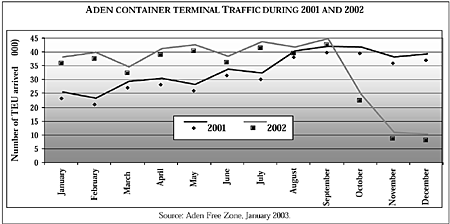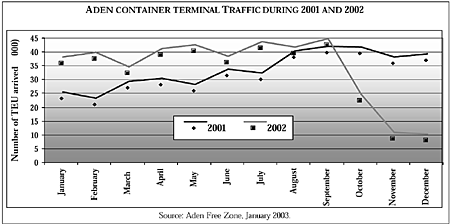
The World Bank’s overview Yemen’s last quarter suffers [Archives:2003/03/Business & Economy]
January 20 2003
The World Bank has given its latest quarterly update on highlighting major economic and policy developments in Yemen. Following is its first part.
(i)Key Policy Developments:
Following the successful conclusion of the Consultative Group Meeting for Yemen in Paris last October, government policy efforts focused on preparations of the 2003 budget (the first after the preparation of the Poverty Reduction Strategy-PRSP), expediting accession to the WTO, voter registration and preparations for the April 2003 elections, tackling the adverse effects of the attack on the French oil tanker, and enhancing domestic security.
After the approval of a budgetary supplement for 2002 by the Parliament and the President, the Parliament’s Budget Committee had extensive discussions of the 2003 budget and the Parliament endorsed the budget in the last day of the year. In October 2002, Yemen submitted its Memorandum on Foreign Trade Regime (MFTR) to the WTO, which is an important step in the country’s effort to join the WTO. Voter registration was completed without major difficulties in the last quarter of 2002.
The Supreme Elections Committee confirmed that 8.1 million citizens had registered (42% females) and that it has made good progress in electronic recording (computerization) of the voter names and by the end of the year more than 5 million voters were entered and verified. The whole process is expected to be completed by the end of January 2003.
Government efforts to enhance domestic security increased following the attack on the French oil tanker “Limburg” in October and the shooting on a helicopter operated by the Hunt Oil Company in November. In collaboration with the US government, six terrorist suspects were killed in Marib Governorate.
However, the tragic incidents of assassination of the Assistant Secretary-General of Yemen’s Socialist Party (YSP), Mr. Jar Allah Omer, and the killing of three American physicians in Jibla Hospital, Ibb Governorate, overshadowed political debate.
The acts were widely denounced by all political parties. President Saleh strongly condemned both attacks and affirmed Yemen’s strong resolve to eradicate terrorism and to enhance domestic security given the very adverse repercussions of terrorism on the Yemeni economy during the last four years.
The mechanism for implementation, monitoring and follow-up of the PRSP was established by the Cabinet decree No. 294/2002. It set up a ministerial committee, chaired by the Deputy Premier, to oversee the execution of the PRSP. A Technical Committee, chaired by Vice-Minister of Planning will monitor the implementation of the strategy. Finally, a Technical Unit for Poverty Monitoring will also be formed in the Ministry of Planning and Development.
(ii)Economic Developments:
A budgetary supplement of YR 100.9 billion for the 2002 budget was authorized by a presidential decree (No. 47/2002). About YR 59.3 billion of the allocation was earmarked for current spending, YR 17.3 billion for unclassified spending and YR 40.5 billion for capital and investment spending.
The decree emphasized the budgetary supplement should not add to the deficit already approved for the year and is to be financed from additional revenues which accrued in the course of 2002.
The Cabinet and Parliament approved the general budget for the year 2003 in November and December respectively. Total revenues have been estimated at YR 604 billion (including grants, aid, and capital revenues) in comparison with YR 482 billion in 2002. Total projected fiscal spending in 2003 totaled YR 668 billion, in comparison with YR 531 billion in 2002. Significant increases in the allocation for investment spending and maintenance are the major features of the 2003 budget. Total projected fiscal deficit is YR 64 billion (3.9% of GDP).
In its continuous efforts to pursue administrative and civil service modernization, the Cabinet endorsed in November 2002 the proposal to rationalize and reduce the number of Higher Supreme Councils from 24 to 4. The newly proposed councils include: (i) the Higher Council for Economic Development; (ii) the Higher Council for Social Development; (iii) the Higher Council for Education, and; (iv) the Higher Council for Administrative Development. The Cabinet set up an ad hoc committee headed by the Prime Minister and the Minister of Finance to prepare the regulations for these councils.
The Cabinet announced its decision to sell the Public Transportation Corporation to the private sector in a bid to expand the implementation of the privatization program. The privatization will take place through a public auction. The Cabinet transferred financial and accounting irregularities committed in the Corporation to the Central Organization for Control and Audit (COCA) to take the necessary legal actions.
Economic growth in 2002 is expected to be higher than the 3.3% achieved in the previous year. The 2003 budget document states that GDP growth in 2002 is estimated at 4.2%, and projects the same level in 2003. Other macroeconomic indicators projected in the budget documents include unemployment, which is forecast to fall slightly from 11.4% in 2002 to 11% in 2003. Interest rates remained virtually unchanged for more than a year and the exchange rate continued its gradual depreciation (4.2% in 2002).
Monetary policy eased in the second half of 2002 and monetary aggregates (broad and narrow money) increased rapidly during this period. The rate of growth of broad money has been above 20% in the period July-November 2002 (year-on-year). For the whole year, M2 is projected to increase by about 16% as targeted by the Central Bank of Yemen. Inflation rates, however, started to decline in the last quarter of 2002. For the whole year, average inflation rate is projected to increase slightly to 16% up from 11.9% in 2001.
It is projected by the government to stabilize at about 7% in 2003 (see Flash Indicators). Moreover, the favorable oil prices and rise in oil production have led to a significant increase in foreign exchange reserves to about US$ 4.2 billion at end-November 2002 (covering about a year and half of imports).
Other Economic News
About 622 container carriers arrived in Aden Container Terminal during January-October 2002, and the total number of containers unloaded in the port of Aden reached 381,599.
Export revenues (in Yemeni Rials) increased by 56% in January-October 2002 mainly from exports of cotton, honey and vegetables and fruit.
Initial estimates of the damage and economic losses incurred by Yemen from the explosion of the French oil tanker “Limburg” in last October put total costs of about US$ 25 million. The major losses stem from (i) raising of insurance premiums for ships visiting Yemen which forced two international shipping companies to wind up their activities in Yemen; (ii) large-scale losses sustained by local fishermen who used to produce annually about 18 million kg of fish; (iii) negative impact on coastal and natural resources of algae, coral reefs, and maritime plants; and (iv) pollution of the beaches. Resulting pollution has covered 130 km in the direction of Bir Ali. The cost of cleaning and rehabilitation of the shores is estimated at US$ 700,000 in addition to US$ 300,000 needed for equipment purchases and technical expertise.
The Hood Oil Investment is considering building a US$ 235 million oil refinery in Ras Essa in Al-Hodeidah governorate. The refinery is expected to process 45,000 barrels of crude oil per day from the Hunt Oil concession in Marib and Jannah Hunt Oil concession in Marib and Shabwah.
TransGlobe Energy Corporation announced a successful digging of a discovery well at Tasour 7 (Block 3) in Hadhramout.

Development in the Aden Container Termainl after the explosion of the Limburg tanker
The facility of Aden Container Terminal (ACT) was inaugurated in March 1999. It is co-operated by the Port of Singapore Authority and Aden Free Zone. The annual handling capacity of ACT is 500,000 twenty-foot equivalent units (TEUs). The ACT handled a total of 80,000 TEUs in 1999 and about 248,000 TEUs in 2000.
In 2001, the handing ability of ACT increased by more than 52% (reaching 377,000 TEUs). The remarkable increase in activities in 2000 and 2001 improved the competitiveness of Aden in comparison with other regional ports such as Salalah in Oman and Jebel Ali in the UAE. In 2001, Salalah handled TEUs 1.1 million while Jebel Ali port handled TEUs 3.5 million. The closer location of Aden from the main shipping routes between Europe and Asia, the ACT has a great advantage over other ports. Security concerns about Yemeni ports, however, hinder ACT’s ability to attract more customers during the last two years. The attack on the USS Cole and the recent explosion of the Limburg French oil tanker greatly impact traffic in the Aden port.
By the end of December 2002, the number of TEUs handled by ACT was 383,355 representing a 1.6% increase over handling in 2001. Furthermore, handling plummeted considerably after the attack on Limburg on 6 October 2002. The number of TEUs handled declined by 81% from 42,502 TEUs in September 2002 to only 8,064 in December 2002. Before the incidence, performance of ACT was on an increasing trend. During the first nine months of 2002, handling activities were more than 30% higher over the same period in 2001.
In addition to increasing security concerns about safety in the Yemeni ports, the incident also led to a sharp increase in the insurance premiums for any ship loading to Yemen. Since October 2002, the Government of Yemen (GoY) increased its effort towards improving security in the ports. It established a committee chaired by Deputy Primer and Minister of Finance to study the impact of the increases of insurance rates upon ships loading to Yemeni ports and to recommend mitigation measures. The Cabinet approved a draft law on January 7 th 2003 containing a number of measures to reduce insurance costs. In addition, security in the Yemeni ports has increased markedly and efforts are underway to strengthen the coastal guards.
——
[archive-e:03-v:2003-y:2003-d:2003-01-20-p:./2003/iss03/b&e.htm]


